Contributions of Paulo Freire's contribution to the ethical approach in teacher training
Keywords:
moral education, professional values, pedagogical professionalismAbstract
The article addresses the contributions of Paulo Freire's pedagogical thought to education with an ethical, axiological and humanistic approach, and its impact on teacher training. The objective is assess the significance of Paulo Freire's educational thought and the ethical, axiological and humanistic approach, its importance in teacher training. Historical-logical methods are used in the study of the historical evolution of Freirean educational thought and teacher training in the Dominican Republic, analytical-synthetic methods are used to study the essences of the key concepts, systematization, allowed the articulation of knowledge, approaches and theories about the object, the analysis of documentary sources, for the study of programmatic documents. For Freire, the human being is essential in the teaching-learning process and his education; in which the student has a leading role based on active and participatory methods, an important axis of its popular education methodology, prioritizes the analysis of reality and takes into account the conditions of the moral climate and the values, of the subjectivities of learners, educators and community, and the humanism inherent to libertarian education. The conclusions reveal that the thought of Freire, a revolutionist of education for human liberation, is marked in teacher training. He provided methods for popular education against banking education and for dialogic, reflective and critical thinking based on ethics, morals, values and humanism.









